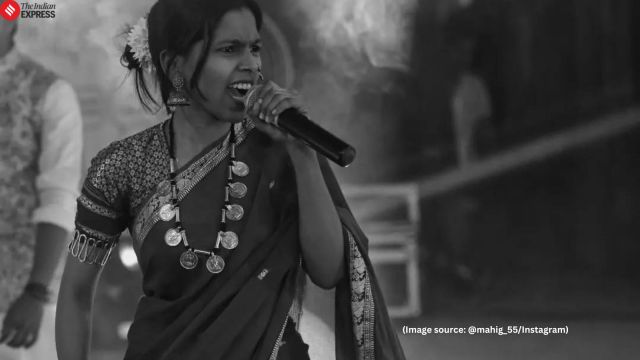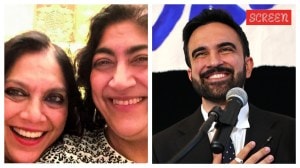Rap didn’t come into being for Jay-Z and Kanye West to make their millions. It began as the musical form of a marginalised Black community in 20th-century America — it was the sound of defiance, music of a rebellion. That musical awakening has, in turn, inspired Maharashtra’s Madhura Ghane in amplifying her identity and inspiring a new generation within her community to be better human beings.
A Mahadev Koli Adivasi, Ghane, is not chasing fame through her words. Instead, she is using her platform to educate the social media generation, more as a service than a performance. Through her thought-provoking rap on B R Ambedkar, Baapmanus, and critical issues like farmers’ struggles and transgender rights, Ghane is addressing societal challenges that often go unheard.

Born in Kalan, Maharashtra, Mahi G (Ghane’s stage name) grew up amid dense forests and a rich cultural backdrop. The daughter of a bus conductor, she followed a path many do, cracking an engineering degree and landing a job at Infosys, where she worked for a few years. But her love for poetry was never just a hobby. Even while juggling her nine-to-five job, she kept writing.
Story continues below this ad
It wasn’t until 2019 that Ranveer Singh and Alia Bhatt’s Gully Boy, directed by Zoya Akhtar, was released, and rap found itself in the limelight. Seeing the kinship between her art form and hip-hop, Ghane embraced rap.
When an artist comes into the spotlight, people often wonder what inspired them. Was it a Bollywood icon? A public figure? A philanthropist? In Ghane’s case, it wasn’t the glitz and glamour of the entertainment world that moved her. As she said in an interview with indianexpress.com, her muse has always been nature—the forest—the world she grew up in.
Here is an excerpt from the interview.
Why did you choose rap? Is it because the genre is often used to highligt societal issues?
I think rap is a music form that allows us to express our strong emotions in just a few words. For me, it is a powerful art form that can be used to display rage or aggression. I wanted to write a rap during the farmers’ protest, I felt like experimenting with the art form because the youth today have little interest in politics and national issues. But it all started in 2019 when Gully Boy was released. The art form was trending, and the youth were enjoying it. It is when I decided to rap\ because I wanted the youth to know about what is happening in the country.
Story continues below this ad
You spent time in your village during the COVID lockdown. What stories or issues did you experience there? Any issues that need work from the government? What are the life struggles of your community?
People who live amid nature in jungles lack connectivity. Like connectivity to better healthcare, better roads to reach schools or hospitals, etc. Health facilities, especially, are not enough. People who live in the mountains suffer the most because their kids walk 2-3 km a day to reach schools or hospitals. There’s a concept of Aashramshala, a hostel setup for Adivasi children. But conditions are dire there, little food, and leaking ceilings. But the community has no other option as they depend on agriculture and the forest.
As someone from the Mahadev Koli Adivasi community, how do you see yourself influencing your people?
People from my community lack awareness. For example, the Maharashtra government launched Ladki Bahin Yojana in 2024 to support economically weaker women in Maharashtra. The scheme offers Rs 1,500 per month to women. Recently, there were cases of misuse of the scheme by facilitators and government employees. But the community did not raise voice against it because they are not even aware that such a scheme exists.
Story continues below this ad
I want to make my community aware of these things, slam fraudsters who misuse such schemes through my art form. I try to help them. However, my community doesn’t want unnecessary development or to capitalise on local property. They are happy with whatever they earn through the trekkers. They are happy with the natural resources and the employment opportunities they bring.
How was your childhood? Did your parents want you to remain steadfast with Advasi values?
We were privileged. My father was a bus conductor, and we got a better education as compared to others in the community. My parents are supportive and are happy with the acknowledgement I have been receiving. Had I written something vulgar, included expletives in my rap, my father wouldn’t have liked it. However, I got the writing gene from my father, and he often helps my work to get better by improving it or suggesting changes.
What has been your experience navigating the Indian hip-hop scene as a woman? Do you think there are any stereotypes against women rappers who are politically aware?
Story continues below this ad
There’s a preconceived notion in this industry that men are better at hip-hop or rapping as compared to women, or that there are more male rappers, and more popular. It is a male-dominated industry, and as women, we put our blood and sweat into proving ourselves that we are strong and are serious about the art form, and excel in it. And it is not like women rappers quickly gain attention simply because they are women. It doesn’t work like that. Women rappers work much harder in the industry to be taken seriously.
At times when artists chase fame and often create music for reels and not the musical experience, you have taken things slow and spoken about sensitive issues through your raps. Do you feel a sense of responsibility?
My first rap-writing experience began in 2019 during the farmers’ protest. If any issue hits me or leaves me thinking, I write a rap about it. I don’t want to write about myself and open up about my struggles with the world. I feel every artist should be responsible because their songs are consumed by all age groups, as mobile phones and the internet make entertainment easily accessible.
I personally don’t enjoy things like that. My YouTube has not been monetised yet, there’s no income as such from YouTube, and the views are decent. Still, I care little about views and reach.
Story continues below this ad
Your rap “Baapmanus” is a tribute to Babasaheb Ambedkar. What does Ambedkar mean to you?
I wrote that rap to perform at JNU on Ambedkar Jayanti. I had known about him and his contributions to society. I am aware of the women’s rights he fought for. Not just women, but every citizen of our nation. My school celebrated Ambedkar Jayanti, and this is how we all understood his importance in our lives. Even my right to rap is all because of his contributions.
Do you feel our industry offers enough space for diverse voices in rap?
The industry mostly cares about commercial content. There’s very little space for artists like us. I have been receiving calls from a popular rap-based reality show for a few years now, but there are so many restrictions. Several words cannot be used on national television. This will restrict me and my writing. But, if ever I write something as per their standards and rules, I’ll definitely be a part of it.

































